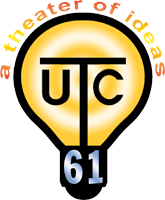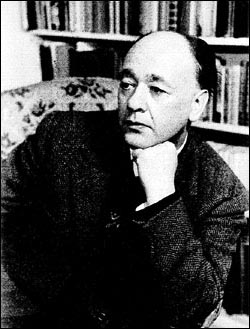

HOME PAGE (More Ionesco links below)

 Quite by accident, his chroniclers would have it, Ionesco turned to playwriting just
before turning 40.1 His first adult play,2 The Bald Soprano, was inspired by an
English language textbook which, by its repetition of simple grammatical constructions
and vocabulary of domestic banality, reiterated essential properties about the world.
For example: the ceiling is above; the floor is below; the city is a noisy place; the
country is a quiet place. The rhythmic coincidence of elementary syntax and semantic
construction of consciousness appealed to Ionesco's sensibility and slid into his own
dialogue. A pair of couples featured in the textbook became the Smiths and the Martins,
and in pre-production, were fashioned in the Victorian cliches of a particularly English
bourgeoisie.
Quite by accident, his chroniclers would have it, Ionesco turned to playwriting just
before turning 40.1 His first adult play,2 The Bald Soprano, was inspired by an
English language textbook which, by its repetition of simple grammatical constructions
and vocabulary of domestic banality, reiterated essential properties about the world.
For example: the ceiling is above; the floor is below; the city is a noisy place; the
country is a quiet place. The rhythmic coincidence of elementary syntax and semantic
construction of consciousness appealed to Ionesco's sensibility and slid into his own
dialogue. A pair of couples featured in the textbook became the Smiths and the Martins,
and in pre-production, were fashioned in the Victorian cliches of a particularly English
bourgeoisie.
Ionesco sent his first completed script out to several theatres, including the Comedie
francaise. At the suggestion of Monique Saint-Come (a translator and friend), a copy
was given to the 23-year-old director, Nicolas Bataille, who decided to take it on.
Bataille and his troupe struggled to arrive at a fitting technique, at first attempting
outright parody, then settling on a much more restrained approach. In order to maintain
the balance of realism and fantasy, the set designer, Jacques Noel, was not given the
script, but rather asked to create the drawing room for Hedda Gabler.
In the process of determining the play's ending, Ionesco proposed a scenario in which
the author would be called to the stage by the maid to put a stop to the quarreling.
The author would approach amid the actors' applause, but upon reaching the stage, would
shout at the audience: "You bunch of crooks! I'll get you!" In lieu of this direct
assault, Ionesco decided to begin the play again; that is, to not end it. At one time
Big Ben Follies or L'Heure Anglaise, the title was found in rehearsal by the actor
playing the Fireman, who substituted the phrase "cantatrice chauve" (bald soprano) for
"institutrice blonde" (blond teacher).
Ionesco had found his medium: "Drama is one of the oldest arts. And I can't help
thinking we cannot do without it. We cannot resist the desire to people a stage with
live characters that are at the same time real and invented...To bring phantoms to
life...is a prodigious adventure, so unique that I myself was absolutely amazed, during
the rehearsals of my first play, when I suddenly saw, moving on the stage...characters
who owed their life to me. It was a terrifying experience. What right had I to do a
thing like that? Was it allowed?... It was almost diabolical."3
In May 1950, The Bald Soprano was received by the majority of critics with dismissive
reviews and was not well attended. After 25 performances at the tiny Theatre des
Noctambules, it was closed. The unfavorable performance hour of 6:30PM was accommodating
another production in the same house: one of Brecht's plays. Ionesco wrote vehemently
against what he perceived as simplistic and reductive artlessness on the part of his
German competition, and parodied Brecht's didacticism with a direct slam/homage in
Improvisation. Nonetheless, the playwright was encouraged by such friends as Breton,
Bunuel, Adamov, Queneau, and Mircea Eliade. In 1957, in repertory with The Lesson, the
most produced of Ionesco's plays reopened at the minuscule Theatre de la Huchette, and
the duo has played there continuously ever since.
Between the closing of his first play and the opening of the second, The Lesson, Ionesco
ventured onto the stage in the role of Stepan Trofimovich in an adaptation of
Dostoevski's The Possessed. Ionesco's reluctant foray into the actor's skin provided a
new level of insight into character and certainly informed the increasing dimensionality
of some of his dramatis personae.
Ionesco's biographers tend to emphasize the dark side of his life, in terms not unlike
the faery tales of yore. They too have depended on the version handed down by the
quixotic, melancholic author himself. As an adolescent, Ionesco experienced a dual
crisis of body & language. Though born in Romania, he had spent his early years with
his younger sister, in France, where his father, Eugene Senior, earned a law degree and
his mother found comfort in the proximity of her parents.
Mr. and Mrs. Ionescu were separated by the First World War (father returned to Bucharest),
and for a while after it ended, mother assumed that father had been injured or died,
as he did not communicate his whereabouts. Meanwhile, father had survived his desk
job without a hitch, and had filed for divorce and full custody, claiming abandonment.
He also remarried without at first divulging his other life. The children were forced
to return to their father's household in Romania, where Eugene's sister was never fully
accepted. Since French was his first language, the teenager was in the position of
watching his body behave in strange ways (which he found to be hideous) while
simultaneously learning his father's language (which he found to be beautiful). The
alienation inherent in this adolescent anguish foreshadows the tenor of many of his
characters' moods and obsessions. Ionesco's father was a politically savvy lawyer whom
he regarded as downright Machiavellian in his attitudes and ability to adapt to the
everchanging guard of Romanian power.
In 1929 the earnest young poet was enrolled in French literature studies at Bucharest
University. An excellent student, he found willing publishers of his earliest literary
criticism, and growing sympatico with a fellow student, Rodica Burileanu (her subjects
were philosophy and law). He was from early on a provocateur, famously contributing
two contradictory literary reviews in consecutive issues of a Romanian journal.
Finally again in his beloved Paris, Eugene and Rodica were married in July of 1936.
His mother died in Romania in October of the same year. Their daughter, Marie-France,
was born before the end of the Second World War. Ionesco never again saw his father
or any form of inheritance.
Ionesco questions the theatrical viability of Moliere (calling his mind
"unmetaphysical" and situations "petty"), while demonstrating by many of his own
plays his indebtedness to "the Master." In fact, he denies having relished the theatre,
as either reader or hearer. Not unlike the way in which Gertrude Stein evokes the
awkward experience of taking in the traditional play, Ionesco describes his discomfort:
"every gesture, every attitude, every speech spoken on the stage destroyed for me a
world that these same gestures, attitudes and speeches were specifically designed to
evoke...as if there were two planes of reality, the concrete, physical, impoverished,
empty and limited reality of these ordinary human beings...and the reality of
imagination...two antagonistic worlds failing to...unite."4
The first theatrical encounter in which he recalls having delighted is the puppet show
in the Luxembourg Gardens. At about the age of four "I ...could stay there,
spellbound, all day long. But I did not laugh. That Punch and Judy show kept me there
open-mouthed, watching those puppets talking, moving and cudgeling each other. It was
the very image of the world that appeared to me, strange and improbable but truer than
true, in the profoundly simplified form of caricature, as though to stress the
grotesque and brutal nature of the truth....until I was fifteen...[e]very live show
awoke in me this feeling for the strangeness of the world..."5
In 1958 Ionesco was put in the position of defending and thereby defining the art and
aims of his theatre. Referred to as "the London Controversy," this entanglement was
brought on by the powerful and vociferous theatre critic, Kenneth Tynan. Having at
first welcomed the first London production of The Bald Primma Donna, later, in the
pages of The Observer, Tynan withdraws his favorable opinion and chastises Ionesco's
plays on the grounds that they are not politically correct. "M. Ionesco's theatre is
pungent and exciting, but it remains a diversion. It is not on the main road: and we
do him no good, nor the drama at large, to pretend that it is..."6 Much of the
exchange which ensued centered around the aesthetics of realism and the purpose of
art, and on Tynan's part, rested on the givens of Brecht's epic theatre.
Ionesco's contributions to the debate clarify his intentions; they also deny and then
reveal the unrepressable urge to expound a theory: "I have attempted...to exteriorize,
by using objects, the anguish of my characters, to make the set speak and the action
on the stage more visual, to translate into concrete images terror, regret or remorse,
and estrangement, to play with words (but not to send them packing) and even perhaps
to deform them--which is generally accepted in the work of poets and humorists. I have
thus sought to extend the idiom of the theatre."7
As opposed to "theatre of the absurd," Ionesco preferred to call his work "theatre of
derision." Throughout his lifetime, he remained an independent thinker, neither truly
apolitical, nor a "joiner." He was perhaps in theory, an ambivalent playwright, but
in practice, an engaged and enraged citizen of the world of letters.
--Karen Lee Ott, Festival Dramaturg
Sources: 1. Esslin M. The Theatre of the Absurd. London: Penguin/Pelican, 1968.
2. Gussow M. "Eugene Ionesco March 29, 1994." In: Theatre on the Edge: New Visions,
New Voices. New York: Applause, 1998. 3. Ionesco E. Notes and Counter Notes: Writings
on the Theatre. Watson D, trans. New York: Grove, 1964. 4. Ionesco E. Theatre Complet.
Jacquart E, ed. Paris: Gallimard/Pleiade,1991. 5. Lista G. "Ionesco, Eugene."
In: Le Dictionnaire Encyclopedique du Theatre. Corvin M, ed. Paris: Bordas, 1991.
6. Olsen S. www.ionesco.org. Accessed 7/24/01.

 Links to other Ionesco Festival sites
Links to other Ionesco Festival sites
 Untitled Theater Company #61 Home Page
Untitled Theater Company #61 Home Page
 Curator's note
Curator's note
 Essay on Rhinoceros
Essay on Rhinoceros
 Production List
Production List
 Shorts
Shorts
 Seminars
Seminars
 Readings
Readings
 Venues
Venues
 Day by Day Schedule
Day by Day Schedule
 Films
Films
 Staff and sponsors
Staff and sponsors
 Festival Passes
Festival Passes
 More information on Ionesco and his plays at www.ionesco.org
More information on Ionesco and his plays at www.ionesco.org